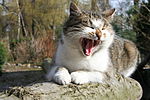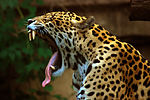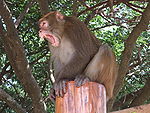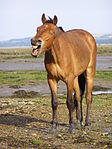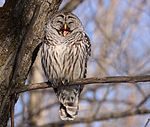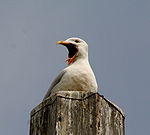- Yawn
-
"Yawning" redirects here. For the fish species, see Yawning (fish).
 Joseph Ducreux pandiculating; self-portrait ca. 1783
Joseph Ducreux pandiculating; self-portrait ca. 1783
A yawn is a reflex of simultaneous inhalation of air and stretching of the eardrums, followed by exhalation of breath. Pandiculation is the act of yawning and stretching simultaneously.[1]
Yawning is commonly associated with tiredness, stress, overwork, lack of stimulation and boredom. In humans, yawning is often triggered by others yawning (e.g. seeing a person yawning, talking to someone on the phone who is yawning) and is a typical example of positive feedback.[2] This "infectious" yawning has also been observed in chimpanzees and dogs.[3]
Contents
Etymology
Yawn, from Old English 'Ginian' and 'Gionian' meaning to "Open the mouth wide, gape," which in turn comes from the Proto-Germanic base gin- (through etymological reconstruction)
Proposed causes
There are a number of theories that attempt to explain why animals yawn.[4][5] It is likely that there are a number of triggers for the behavior. However, there are a few select theories that attempt to explain the primary evolutionary reason for the yawn. None of them have been empirically substantiated.
One states that yawning occurs when one's blood contains increased amounts of carbon dioxide and therefore becomes in need of the influx of oxygen (or expulsion of carbon dioxide) that a yawn can provide,[4] but studies have since shown it to be either incorrect or, at the very best, flawed.[6] Yawning may in fact reduce oxygen intake compared to normal respiration, not increase it.[7]
Another speculated reason for yawning is the desire to stretch one's muscles.[8] Yawns are often accompanied by the urge to stretch. Prey animals must be ready to physically exert themselves at any given moment. There have been studies that suggest yawning, especially psychological "contagious" yawning, may have developed as a way of keeping a group of animals alert.[9] If an animal is drowsy or bored, it may not be as alert as it should to be prepared to spring into action. Therefore, the "contagious" yawn could be an instinctual reaction to a signal from one member of the "herd" reminding the others to stay alert. Nervousness has also been suggested as a possible reason. Nervousness often indicates the perception of an impending need for action. Anecdotal evidence suggests that yawning helps increase the state of alertness of a person. Paratroopers have been noted to yawn in the moments before they exit the aircraft.[10]
 Research data strongly suggest that neither contagious nor story-induced yawning are reliable in children below the age of six years.[11]
Research data strongly suggest that neither contagious nor story-induced yawning are reliable in children below the age of six years.[11]
Another notion states that yawning is the body's way of controlling brain temperature.[12][13] In 2007, researchers, including a professor of psychology, from the University of Albany proposed that yawning may be a means to keep the brain cool. Mammalian brains operate best within a narrow temperature range. In two experiments, they demonstrated that both subjects with cold packs attached to their foreheads and subjects asked to breathe strictly nasally exhibited reduced contagious yawning when watching videos of people yawning.[14][15] A similar recent hypothesis is that yawning is used for regulation of body temperature. Similarly, a study by Jared Guttmann at Worcester Polytechnic Institute found that when a subject wearing earplugs yawned, a breeze is heard caused by the flux of the air moving between the subject's ear and the environment. Researcher Guttmann determined that a yawn causes one of three possible situations to occur: the brain cools down due to an influx or outflux of oxygen, the pressure in the brain is reduced by an outflux of oxygen, or the pressure of the brain is increased by an influx of air caused by increased cranial space.
Another hypothesis is that yawns are caused by the same chemicals (neurotransmitters) in the brain that affect emotions, mood, appetite, and other phenomena. These chemicals include serotonin, dopamine, glutamic acid, and nitric oxide. As more (or less) of these compounds are activated in the brain, the frequency of yawning increases. Conversely, a greater presence in the brain of opioid neurotransmitters such as endorphins reduces the frequency of yawning. Individuals in opioid withdrawal exhibit a greatly increased frequency of yawning. Patients taking the selective serotonin reuptake inhibitors Paxil (paroxetine HCl) or Celexa (citalopram) have been observed yawning more often.[citation needed] Excessive yawning is more common during the first three months of taking the SSRI's. Anecdotal reports by users of psilocybin mushrooms often describe a marked stimulation of yawning while intoxicated, often associated with excess lacrimation and nasal mucosal stimulation, especially while "peaking" (undergoing the most intense portion of the psilocybin experience). While opioids have been demonstrated to reduce this yawning and lacrimation provoked by psilocybin,[citation needed] it is not clear that the same pathways that induce yawning as a symptom of opioid abstinence in habituated users are the mode of action in yawning in mushroom users. While even opioid-dependent users of psilocybin on stable opioid therapy often report yawning and excess lacrimation while undergoing this entheogenic mushroom experience, there are no reports in the literature of habituated users experiencing other typical opioid withdrawal symptoms such as cramping, physical pain, anxiety, gooseflesh, etc., on mushrooms.
Recent research carried out by Garrett Norris, a lecturer in psychology at the University of Leeds, involving monitoring the behavior of students kept waiting in a reception area indicates a connection (supported by neuro-imaging research) between empathic ability and yawning. "We believe that contagious yawning indicates empathy. It indicates an appreciation of other people's behavioral and physiological state." said Garrett.[16]
Yawning behavior may be altered as a result of medical issues such as diabetes,[17] stroke,[18] or adrenal conditions.[19]
It is also possible that yawning is a less potent territorial reflex. Usually being associated with boredom or lack of interest, yawning is often displayed when the subject is faced with a worrying or dangerous situation. Therefore, to yawn in the presence of a rival for territory would portray the subject as unthreatened by the rival in order to deter it from entering the subject's territory. This behavior is seen in many primates as well as some feline species.[citation needed]
To look at the issue in terms of a possible evolutionary advantage, yawning might be a herd instinct.[20] For example, theories suggest that the yawn serves to synchronize mood in gregarious animals, similar to the howling of the wolf pack. It signals tiredness to other members of the group in order to synchronize sleeping patterns and periods.
Contagiousness
 Two women ironing by Edgar Degas
Two women ironing by Edgar Degas
The yawn reflex has long been observed to be contagious. In 1508, Erasmus wrote, "One man's yawning makes another yawn.,"[21] and the French proverbialized the idea to "Un bon bâilleur en fait bâillier deux." ("One good gaper makes two others gape").[22] Often, if one person yawns, this may cause another person to "empathetically" yawn.[7][23] Observing another person's yawning face (especially his/her eyes), even reading, or thinking about yawning, or looking at a yawning picture can cause a person to yawn.[24][25][26] The proximate cause for contagious yawning may lie with mirror neurons in the frontal cortex of certain vertebrates, which, upon being exposed to a stimulus from conspecific (same species) and occasionally interspecific organisms, activates the same regions in the brain.[27] Mirror neurons have been proposed as a driving force for imitation which lies at the root of much human learning such as language acquisition. Yawning may be an offshoot of the same imitative impulse.
A 2007 study found that young children with autism spectrum disorders do not increase their yawning frequency after seeing videos of other people yawning, in contrast to typically developing children. In fact, the autistic children actually yawned less during the videos of yawning than during the control videos. This supports the claim that contagious yawning is related to empathic capacity.[28]
This phenomenon has been observed among various primates. In these cases the yawn is a threat gesture, a way of maintaining order in the primates' social structure. Specific studies were conducted on chimpanzees[29] and stumptail macaques.[30] A group of these animals was shown a video of other conspecifics yawning; both species yawned as well. This helps to partly confirm a yawn's "contagiousness".
The Discovery Channel's show Mythbusters also tested this concept. In their small-scale, informal study they concluded that yawning is contagious.[31]
Gordon Gallup, who hypothesizes that yawning may be a means of keeping the brain cool, also hypothesizes that "contagious" yawning may be a survival instinct inherited from our evolutionary past. "During human evolutionary history, when we were subject to predation and attacks by other groups, if everybody yawns in response to seeing someone yawn the whole group becomes much more vigilant and much better at being able to detect danger."[14]
A recent study by the University of London has suggested that the "contagiousness" of yawns by a human will pass to dogs. The study observed that 21 of 29 dogs yawned when a stranger yawned in front of them, but did not yawn when the stranger only opened his mouth.[3]
Non-human yawning
In animals, yawning can serve as a warning signal. For example, Charles Darwin, in his book The Expression of the Emotions in Man and Animals, mentioned that baboons yawn to threaten their enemies, possibly by displaying large canine teeth.[32] Similarly, Siamese fighting fish yawn only when they see a conspecific (same species) or their own mirror-image, and their yawn often accompanies aggressive attack.[33] Guinea pigs also yawn in a display of dominance or anger, displaying their impressive incisor teeth. This is often accompanied by teeth chattering, purring and scent marking. Adelie Penguins employ yawning as part of their courtship ritual. Penguin couples face off and the males engage in what is described as an "ecstatic display," opening their beaks and pointing their faces skyward. This trait has also been seen among Emperor Penguins. Researchers have been attempting to discover why these two different species share this trait, despite not sharing a habitat. Snakes yawn, both to realign their jaws after a meal and for respiratory reasons, as their trachea can be seen to expand when they do this. Dogs often yawn after seeing people yawn and when they are confused.[34] Fish can also yawn, and they increase this behavior due to lack of oxygen or excessive heat.[35]
Culture
Some cultures lend yawning spiritual significance. The Ancient Greeks and classic Maya believed that yawning was a sign that a person's soul was trying to escape from his or her body. Covering the mouth when yawning might then prevent the soul from escaping.[36]
Exorcists believe that yawning can indicate that a demon or possessive spirit is leaving its human host during the course of an exorcism.[37]
Several superstitions have developed regarding the act of yawning and the harm that the act can do to the individual who is yawning. These superstitions may not only have arisen to prevent people from committing the faux pas of yawning loudly in another's presence (one of Mason Cooley's aphorisms is "A yawn is more disconcerting than a contradiction."), and in 1663 Francis Hawkins advised "In yawning howl not, and thou shouldst abstain as much as thou can to yawn, especially when thou speakest",[38] but may also have arisen from concerns over public health. Polydore Vergil (c. 1470–1555), in his De Rerum Inventoribus, writes that it was customary to make the Sign of the Cross over one's mouth, since "alike deadly plague was sometime in yawning, wherefore men used to fence themselves with the sign of the cross...which custom we retain at this day."[39]
Yawning is often considered rude due to the implication of boredom, and may even lead to penalties for contempt of court.[40]
George Washington said "If You Cough, Sneeze, Sigh, or Yawn, do it not Loud but Privately; and Speak not in your Yawning, but put Your handkerchief or Hand before your face and turn aside."[41]
References
- ^ MedOnline.net, "pandiculate"
- ^ Camazine, Deneubourg, Franks, Sneyd, Theraulaz, Bonabeau, Self-Organization in Biological Systems, Princeton University Press, 2003. ISBN 0-691-11624-5, ISBN 0-691-01211-3 (pbk.) p. 18.
- ^ a b Carpenter, Jennifer (August 5, 2008). "Pet dogs can 'catch' human yawns". BBC NEWS. http://news.bbc.co.uk/1/hi/sci/tech/7541633.stm. Retrieved 2009-10-03.
- ^ a b MSN.com, "Little Mystery: Why Do We Yawn?"
- ^ Chudler, Eric H (July 31, 2007). "Yawning...and Why Yawns are Contagious". University of Washington. http://faculty.washington.edu/chudler/yawning.html. Retrieved 2009-10-03.
- ^ Thinkquest.org, Brain: Organ of the Mind"
- ^ a b Provine RR; Tate BC; Geldmacher LL (2005). "Yawning". American Scientist 93 (6): 532. doi:10.1511/2005.6.532. PMID 3120687. Archived from the original on June 4, 2008. http://web.archive.org/web/20080604061455/http://www.americanscientist.org/template/AssetDetail/assetid/47361. Retrieved 2009-05-28.
- ^ Thinkquest.org, – "Brain: Organ of the Mind"
- ^ Reallyworks.org – "What Causes Yawning: The Real Reason Why People Yawn"
- ^ Hooper, Rowan (2 July 2007). "Yawning may boost brain's alertness". New Scientist. http://www.newscientist.com/article/mg19426104.400-yawning-may-boost-brains-alertness.html. Retrieved 2009-09-01.
- ^ James R. Anderson and Pauline Meno (2007). "Psychological Influences on Yawning in Children". Current psychology letters [Online] 2 (11).
- ^ Science Daily: "Psychologists Attribute Yawning To The Need To Cool The Brain And Pay Attention"
- ^ "Discovery News". http://dsc.discovery.com/news/2008/12/15/yawn-brain-head.html. Retrieved 2008-12-15.
- ^ a b Gordon G. Gallup (2007). Good Morning America – The Science of Yawning (July 30, 2007) (TV-Series). USA: ABC. http://abcnews.go.com/GMA/Story?id=3425960&page=1.
- ^ Gallup AC & Gallup GG Jr (2007). "Yawning as a brain cooling mechanism: Nasal breathing and forehead cooling diminish the incidence of contagious yawning." (PDF). Evolutionary Psychology 5 (1). http://www.epjournal.net/filestore/ep0592101.pdf. Retrieved 2009-05-28.
- ^ Sign of empathy
- ^ Zheng H, Bidasee KR, Mayhan WG, Patel KP (2006). "Lack of central nitric oxide triggers erectile dysfunction in diabetes". Am J Physiol Regul Integr Comp Physiol 292 (3): R1158–R1164. doi:10.1152/ajpregu.00429.2006. PMID 17095652. http://ajpregu.physiology.org/cgi/content/full/292/3/R1158. Retrieved 2009-05-28.
- ^ Telegraph.co.uk
- ^ Anías-Calderóna J,Verdugo-Díaz L, Drucker-Colín R (2004). "Adrenalectomy and dexamethasone replacement on yawning behavior". Behavioural Brain Research 154 (1): 255–259. doi:10.1016/j.bbr.2004.02.013. PMID 15302132. http://www.sciencedirect.com/science?_ob=ArticleURL&_udi=B6SYP-4C1NH18-1&_user=10&_rdoc=1&_fmt=&_orig=search&_sort=d&view=c&_acct=C000050221&_version=1&_urlVersion=0&_userid=10&md5=7836af0e9d1c4e3879944073aceada80. Retrieved 2009-05-28.
- ^ Schürmann et al.; Hesse, MD; Stephan, KE; Saarela, M; Zilles, K; Hari, R; Fink, GR (2005). "Yearning to yawn: the neural basis of contagious yawning.". NeuroImage 24 (4): 1260–1264. doi:10.1016/j.neuroimage.2004.10.022. PMID 15670705. (see also Platek et al.; Mohamed, FB; Gallup Jr, GG (2005). "Contagious Yawning and The Brain.". Cognitive Brain Research 23 (2–3): 448–52. doi:10.1016/j.cogbrainres.2004.11.011. PMID 15820652.)
- ^ Erasmus Adagio Chil. III, cent. iv, No 95 (1508) quoted in Stevenson, Burton ed. The Macmillan Book of Proverbs, Maxims, and Famous Phrases. New York: Macmillan, 1948.
- ^ Stevenson, Burton ed. The Macmillan Book of Proverbs, Maxims, and Famous Phrases. New York: Macmillan, 1948. non selective serotonin reuptake inhibitors may cause yawning.
- ^ The website by Émilie attempts to prove this.
- ^ Provine RR; Tate BC; Geldmacher LL (2005). "Yawning". American Scientist 93 (6): 532. doi:10.1511/2005.6.532. PMID 3120687. Archived from the original on June 4, 2008. http://web.archive.org/web/20080604061455/http://www.americanscientist.org/template/AssetDetail/assetid/47361. Retrieved 2009-05-28.
- ^ Provine RR (1986). "Yawning as a stereotyped action pattern and releasing stimulus". Ethology 72 (2): 109–122. doi:10.1111/j.1439-0310.1986.tb00611.x. http://cat.inist.fr/?aModele=afficheN&cpsidt=8101503.
- ^ Krulwich, Robert (September 24, 2007). "The Quest to Design the Perfect Yawn: NPR". NPR. http://www.npr.org/templates/story/story.php?storyId=14654608. Retrieved 2009-09-01.
- ^ V.S. Ramachandran, "Mirror Neurons and imitation learning as the driving force behind "the great leap forward" in human evolution". http://www.edge.org/3rd_culture/ramachandran/ramachandran_p1.html. Retrieved 2006-11-16.
- ^ Senju A, Maeda M, Kikuchi Y, Hasegawa T, Tojo Y, Osanai H (2). "Absence of contagious yawning in children with autism spectrum disorder". Biol Lett 3 (6): 706–8. doi:10.1098/rsbl.2007.0337. PMC 2391210. PMID 17698452. http://www.pubmedcentral.nih.gov/articlerender.fcgi?tool=pmcentrez&artid=2391210.
- ^ Anderson JR, Myowa-Yamakoshi M & Matsuzawa T (2004). "Contagious yawning in chimpanzees". Proceedings of the Royal Society of London B: Biological Sciences 271: S468–S470. doi:10.1098/rsbl.2004.0224. PMC 1810104. PMID 15801606. http://www.pubmedcentral.nih.gov/articlerender.fcgi?tool=pmcentrez&artid=1810104.
- ^ Paukner A & Anderson JR (2006). "Video-induced yawning in stumptail macaques (Macaca arctoides)". Biology Letters 2 (1): 36–38. doi:10.1098/rsbl.2005.0411. PMC 1617183. PMID 17148320. http://www.pubmedcentral.nih.gov/articlerender.fcgi?tool=pmcentrez&artid=1617183.
- ^ DSC.discovery.com
- ^ Chadwick-Jones, John K. (1998). Developing a social psychology of monkeys and apes. Taylor and Francis. p. 48. ISBN 0863778208. http://books.google.com/?id=SDiB_dDG8vYC&pg=PA48&dq=baboon+yawn&q=.
- ^ Baenninger R (1987). "Some comparative aspects of yawning in Betta sleepnes, Homo Sapiens, Pantera leo and Papio sphinx.". Journal of Comparative Psychology 101 (4): 349–354. doi:10.1037/0735-7036.101.4.349.
- ^ Fisher, Gail T. (September 14, 2008). "Some reasons for dog yawning". All Dogs Gym & Inn.. http://www.alldogsgym.com/index.php?option=com_content&task=view&id=436. Retrieved 2009-10-03.
- ^ "Fish do yawn! An occasional yawn is normal! If all the fish in an aquarium are yawning every few minutes or so, call us. This may indicate a dissolved oxygen or temperature problem." "Fish facts" on aquariumpros.com
- ^ Buzzle.com, "What causes a yawn"
- ^ Baglio, Matt (2009). The Rite: The Making of a Modern Exorcist. Doubleday Religion. ISBN 9780385522700.
- ^ Hawkins, Francis Youth's Behavior, or, Decency in Conversation amongst Men (1663) quoted in Mencken, H.L.. A New Dictionary of Quotations on Historical Principles from Ancient and Modern Sources New York: Vintage, 1942
- ^ Iona Opie and Moira Tatem, A Dictionary of Superstitions (Oxford: Oxford University Press, 1992), 454.
- ^ Liu, Caitlin (April 20, 2005). Sleepy Juror Gets Rude Awakening. Los Angeles Times. http://articles.latimes.com/2005/apr/20/local/me-yawn20.
- ^ Washington, George; Conway, Moncure Daniel (1890). George Washington's Rules of civility: traced to their sources and restored. University of California. p. 59. http://books.google.com/books?id=_bZEAAAAIAAJ&pg=PA59&dq=If+You+Cough,+Sneeze,+Sigh,+or+Yawn,+do+it+not+Loud+but+Privately;+and+Speak+not+in+your+Yawning,+but+put+Your+handkercheif+or+Hand+before+your+face+and+turn+aside#v=onepage&q&f=false.
External links
Categories:- Sleep
- Sleep physiology
- Reflexes
Wikimedia Foundation. 2010.

